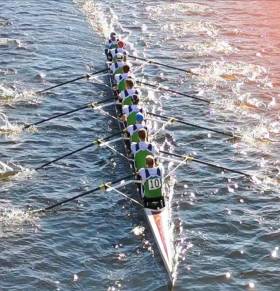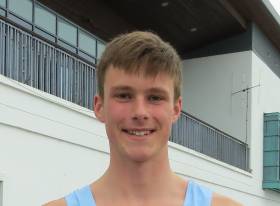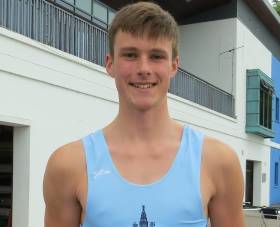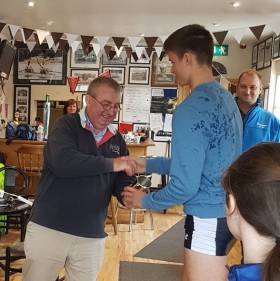Displaying items by tag: Dorney
Shandon Man Dorney Third at Head of the Charles in Boston
#Rowing: Jack Dorney (18) finished third in the Head of the Charles Regatta in Boston today. The Shandon man, defending his title in the men’s youth singles, was beaten by the winner, Nicholas Aronow, and second-placed Isaiah Harrison.
In the men’s senior master eights (average age 50 plus), an Irish Masters Boat Club crew made up of rowers from around Ireland took fourth. Ex Nemo won, while the second-placed Upper Yarra crew featured former Australian greats Duncan Free and James Tomkins as the stern pair.
O'Donovan and O'Driscoll Win at Ireland Trial
#Rowing: Paul O’Donovan finished fifth overall in the single sculls at the Armada Cup, and Sanita Puspure third in the Gold Cup in Philadelphia, a race that was part of the Head of the Schuylkill event.
At the Ireland trial at the National Rowing Centre, Shane O’Driscoll and Mark O’Donovan won the men’s pair on Sunday, with David O’Malley and Shane Mulvaney second. O'Driscoll and O'Donovan did not compete on the Saturday.
Jack Dorney of Shandon won both the junior single sculls and the junior double, with Castleconnell’s Rory O’Neill. Molly Curry had equivalent wins: she teamed up with Lauren O’Brien – also of Castleconnell – on the Sunday.
UCD’s men’s senior eight were fastest at the Castleconnell Head of the River, and Enniskillen junior crews also shone.
Ireland Trial, National Rowing Centre (Provisional Results; winners) Saturday
Men
Pair - Senior: UCD (S Mulvaney, D O’Malley). Under-23: UCD (S O’Connell, A Goff).
Single - Senior: Shandon (A Harrington). Under-23: UCC (R Byrne)
Women
Pair: UCC, Skibbereen (A Keogh, E Hegarty). Under-23: Neptune, UCD (C Feerick, E Lambe). Jun: Cork Boat Club (C O’Sullivan, J Duggan).
Single – Sen: Killorglin (M Dukarska). Lightweight: Skibbereen (D Walsh). Under-23 Lightweight: Skibbereen (L Heaphy). Junior: Coleraine GS (M Curry).
Sunday
Men
Four – Under-23: O’Connell, Goff, Keating, Whittle. Jun 18: Gallagher, Daly, Butler, Murphy
Pair: M O’Donovan, S O’Driscoll
Double – Sen: Haugh, Crowley. Lightweight: J McCarthy, F McCarthy. Lwt U-23: Sutton, Gaffney Jun 18: Dorney, O’Neill.
Single – Sen: Byrne. U-23: Bann (Christie). Lightweight: Sutton.
Women
Four – Under-23: Hanlon, Casey, Lambe, Feerick. Jun 18: O’Sullivan, Duggan, Tyther, O’Donoghue.
Pair – Hegarty, Keogh. Jun 18: McGrath, Gannon
Double – Sen: Dukarska, Crowley. Lightweight: Walsh, Casey. Jun 18: Curry, L O’Brien.
Single – Lightweight: Legresley. U-23: Heaphy. Jun 18: Gilmore.
Shandon Excel at Cork Head of the River
#Rowing: Shandon amassed a big set of wins at the Cork Head of the River at the Marina on Saturday. Their men’s senior quadruple, competing in the fourth head, set the fastest time of 12 minutes 3.4 seconds, while their men’s senior eight were just .6 of a second slower. They competed in head one and were the second-fastest crew overall. Jack Dorney was the fastest single sculler.
Cork Boat Club's women reeled off a set of wins. The fastest women’s crew was their club two eight, while Grace Collins of the same club was the fastest women’s single sculler.
Cork Head of the River, The Marina, Saturday (Selected Results)
Overall: 1 Shandon men’s senior quadruple 12 minutes 3.4 seconds (Head Four), 2 Shandon men’s senior eight 12 mins 4 secs (Head One), 3 Cork men’s inter eight 12:17.3 (H1).
Men
Eight – Senior: Shandon 12:04.0. Inter: Cork 12.17.3. Club Two: Shandon 13.13.
Four – Sen: Shandon 12:37. Inter, coxed: Shandon 13:55.3. Club Two, coxed: Waterford 15:41.6. Jun 18A, coxed: Shandon 14:13.3.
Pair – Sen: Cork A 13:44.1. Jun 18A: Fermoy 14:28.9. Jun 16, coxed: Presentation (Rolling Head) 14:24.6. Masters, coxed: Shandon (b) 15:17.4.
Sculling – Quadruple – Sen: Shandon 12:03.4. Inter: Shandon 12:36.2. Jun 18A: Lee B 12:53.1. Masters, coxed: Shandon A (a) Rolling Head 15:24.8
Double – Club Two: Shandon 15:27.5. Jun 18A: Cork 13:41.3.
Single – Sen: 1 Shandon (J Dorney, sen, H2) 15:18.8. Inter: Cork (C O’Sullivan) 15:44.7. Club Two: Lee (P Hearty) 18:11.1. Jun 18A: Lee (A Sheehan, H2) 15:30.2. Jun 16: Kenmare (T Kelly) 15:48.7. Masters: Shandon (H Merz, d; Rolling Head) 15:25.7.
Women
Eight – Club Two: Cork 14:28.5. Pair - Sen: Cork 16:47.2. Jun 18: Cork A 16:08.
Four – Club Two, coxed: Cork A 15:04.9. Masters, coxed: Cork (d) 16:38.4.
Sculling – Quadruple – Inter: Cork 15:27.3. Jun 18A: Shandon A 15:23.1. Jun 16, coxed: Lee 16:19.2. Masters, coxed: Graiguenamanagh (b) 17:15.2.
Double – Inter: Cork A 15:11. Jun 18A: Lee A 15:37.3.
Single – Inter: Cork (G Collins) 16:13.4. Club Two: Shandon (J Legresley) 16:01.5. Novice: Lee (O Commins) 17:35.9. Jun 18A: Kenmare (E Crowley) 15:38.7. Jun 16: Shandon (J Forde) 15:55.9. Masters: Shandon (J Legresley; b) 17:49.8 (Rolling Hd)
Dorney and Lynch top Junior Rankings at All Ireland Open and Youth Regatta
Jack Dorney of Shandon won the junior 18 single sculls at the Irish Open and All Ireland Junior Regatta at the National Rowing Centre in Cork today. His nearest rival was James O’Donovan of Castleconnell. Both represented Ireland this season and both are junior again for the 2019 season.
Aoife Lynch of Lee was the top junior woman, just ahead of Lauren O’Brien of Castleconnell.
The best women’s open pair of the day was the UCC/Skibbereen combination of Tara Hanlon and Niamh Casey.
Commercial and Shandon Shine in the Sun at Metro Regatta
Rowing: Commercial won the Division One coxed and coxless fours and the Division One pairs (through intermediates Charlie Cunningham and Lorcain Cameron), while 17-year-old Jack Dorney took the men’s Division One single sculls at the refixed Metro regatta at Blessington today.
The day could hardly have been better for rowing, but the entry was thin because of clashes with exams and other events. Young competitors shone: the women’s Division One pair A Final was made up entirely of junior 18 crews, with Castleconnell the clear winners; the New Ross’s junior 18 crew of Shona Tierney and Lara Brown were the top women’s double scull and Tristan Orlic of Neptune, who is 16, won Division Two of the men’s single single sculls.
Metropolitan Regatta, Blessington, Saturday
Men
Eight – Div Two: Neptune (club two) 5:40.496.
Four – Div One: Commercial A (sen) 5:36.26. Four, coxed – Div One: 1 Commercial (sen) 5:55.01, 2 Shandon (jun 18A) 5:55.99, 3 Commercial (inter) 5:56.41; 5 UCD (club one) 6:02.82.
Pair – Div One: Commercial (inter) 6:07.65, 2 Commercial (sen) 6:14.6. B Final: 2 Castleconnell 6:25.78; 4 Belfast RC (club one) 6:43.92.
Sculling, Single – Div One: Shandon (J Dorney; jun 18A) 6:34.78, 2 St Michael’s (D O’Connor; sen) 6:37.81. B Final: Three Castles (T McKnight; inter) 6:47.52; 5 Commercial (J Casey; club one) 7:11.88. Div Two: Neptune (T Orlic; jun 16) 6:47. 76, 2 Clonmel (O’Donnell; club two) 6:49.48, 3 St Michael’s (O’Gorman; jun 18B) 7:00.84
Women
Four, coxed – Div Two: Neptune (club two) 6:56.77.
Sculling, Quadruple – Div Two, coxed: Commercial (jun 16) 6:51.87, 2 Neptune (club two) 6:54.06, 3 Fermoy (nov) 6:54.57; 6 Commercial (jun 18B) 7:49.09.
Double – Div One: New Ross (jun 18A) 6:43.13; 3 Neptune (club one) 6:48.66; 4 St Michael’s (sen) 7:05.97. Div Two: Carlow (jun 16) 7:11.58, 2 Neptune (club two) 7:36.47.
Single – Div One: 1 Castleconnell (jun 18) 7:14.24.
Dorney and Cremen Top Rankings at Cork Sculling Ladder Trial
#Rowing: Jack Dorney of Shandon Boat Club was the fastest at the Cork Sculling Ladder time trial at the Marina. More than 170 single scullers participated on Sunday in the 46th running of the event, which is sponsored by Argos Fire and Safety Ltd and BioAugmentation Systems Ltd. Dorney won in a time of seven minutes and 7.2 seconds. Three other Shandon scullers filled the next three spots: Alex Byrne, Stephen O’Sullivan and Eoin Gaffney.
Margaret Cremen, who won last last year, was again the fastest woman – the Lee Rowing Club competitor finished 10th overall; Cork Boat Club’s Lisa Dilleen was the next fastest woman. Conditions on the river were calm.
The 2017-2018 Cork Sculling Ladder continues until April 1st.
Cork Sculling Ladder, Time Trial, October 8th. Selected Results:
- Jack Dorney, Shandon Boat Club. 7 min 07.2 sec
- Alex Byrne, Shandon Boat Club. 7:15.8
- Stephen O’Sullivan, Shandon Boat Club. 7:17.7
- Eoin Gaffney, Shandon Boat Club. 7:18.5
- Cian O’Sullivan, Cork Boat Club. 7:25.1
10. Margaret Cremen, Lee Rowing Club. 7:37.9
23. Lisa Dilleen, Cork Boat Club. 8:06.3 (8:07.6)
31. Aoife Lynch, Lee Rowing Club. 8:19.6

































































